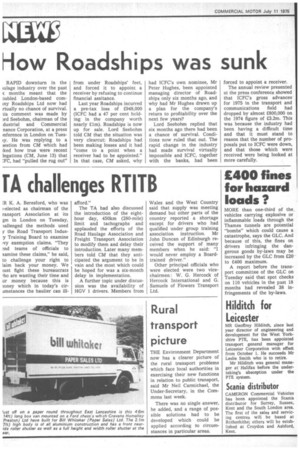How Roadships was sunk
Page 6

If you've noticed an error in this article please click here to report it so we can fix it.
RAPID downturn in the tulage industry over the past ic months meant that the oubled London-based corniny Roadships Ltd now had rtually no chance of survival. us comment was made by )rd Seebohm, chairman of the dustrial •and Commercial nance Corporation, at a press inference in London on Tuesty. He was replying to a iestion from CM which •had ;ked how true were recent legations (CM, June 13) that :FC, had "pulled the rug out" from under Roadships' feet, and forced it to appoint a receiver by refusing to continue financial assitance.
Last year Roadships incurred a pre-tax loss of £948,000 (ICFC had a 47 per cent holding in the company worth nearly £1m). Roadships is now up for sale. Lord Seebohm told CM that the situation was very clearcut: Roadships had been making losses and it had "come to a point when a receiver had to be appointed." In that case, CM asked, why had ICFC's own nominee, Mr Peter Hughes, been appointed managing director of Roadships only six months ago, and why had Mr Hughes drawn up a plan for the company's return to profitability over the next few years?
Lord Seebohm replied that six months ago there had been a chance of survival. Conditions now ruled that out. The rapid change in the industry had made survival virtually impossible and ICFC, together with the banks, had been forced to appoint a receiver.
The annual review presented at the press conference showed that ICFC's gross advances for 1975 in the transport and communications field had dropped by almost £800,000 on the 1974 figure of £3.2m. This was because the industry had been having a difficult time and that it must stand to reason that the number of proposals put to ICFC were down, and that those which were received were being looked at more carefully.












































































































































